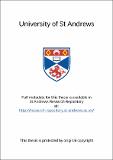A study of the effects of physical education lessons on the cardiorespiratory endurance of secondary schoolboys
Abstract
The research investigated the effects of a school PE programme on a representative group of 9 boys, aged 12 years, 6 months, from a first year class in a Glasgow secondary school. Cardiorespiratory endurance was assessed using the PWC 170 test [EUROFIT (1988)] on 7 occasions during a 12 month period, before and after blocks of teaching in Rugby, HRPF, Basketball, Volleyball and Athletics. Physical activity levels during lessons were assessed by heart rate monitoring using the Sports Tester PE3000 telemetry system. Evaluation of the conditioning effects was carried out in relation to standard guidelines for cardiorespiratory fitness improvement. There was no significant change in PWC 170 during the 12 month period. However there were instances in all five teaching activities where activity levels were of sufficient intensity to increase cardiorespiratory endurance. Subjects were sub-divided into three groups of similar fitness (high, middle and low) and lesson activity levels were further examined in relation to each of these sub-groups. Results showed considerable variation in subjects response to lessons but established no relationship between fitness sub-group and lessons' conditioning effect. Results indicated that the PE programme in general made no improvement in cardiorespiratory fitness and confirmed the individualised nature of heart rate response to PE lessons, highlighting the importance of teaching content and methodology if improved cardiorespiratory endurance is to be an objective for PE in schools.
Type
Thesis, MSc Master of Science
Collections
Items in the St Andrews Research Repository are protected by copyright, with all rights reserved, unless otherwise indicated.

